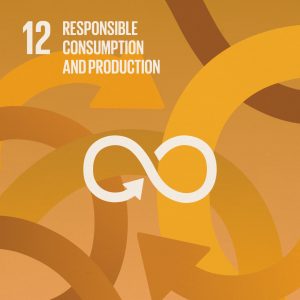As the first person to hold the Director of Sustainability position of SGA, there were a number of uncertainties for what my job might look like when I first started. Though a slightly intimidating concept to be the first of anything, I was excited about the wide array of possibilities that lay before me. In one of the first conversations in which I mentioned my excitement over my upcoming role, I was very surprised by the response I was met with. Instead of an encouraging and congratulatory endorsement, it was a hesitant and slightly skeptical question: “So like… recycling?”

Lauren posing in front of an Auburn, Alabama sign in Costa Rica.
A very coarse and simple question, but one that has truly shaped the way I address different aspects of my job. It was when I received that question that I realized that one of the most apparent obstacles I would face was simply education. Though people are increasingly having sustainability-centered conversations, there are still many gaps in the general population’s understanding of just how multi-faceted sustainability truly is.
Sustainable Development Goal 16 from the United Nations Department of Economic and Social Affairs Sustainable Development division is to “Promote peaceful and inclusive societies for sustainable development, provide access to justice for all and build effective, accountable and inclusive institutions at all levels.” For this goal to become a reality, much of the effort must be pointed to teaching people not only about what this means on a national or even global scale, but also what it means for one’s personal community.
When you read this goal listed on the United Nations’ website, the first few subsections include topics such as armed conflict, international law, and global homicide rates. If you view this information at face value, it may appear as though these issues are so incredibly far outside of our own personal reach that we might as well leave them to national policymakers and global powers to address. However, within these far-reaching topics lie more local targets that once attained have the capacity to amass into worldwide changes. It is important to remember that even though one’s community can seem distant, especially right now as we observe social distancing guidelines, some way and somehow, everyone is connected. As global citizens, our localized communities connect and expand our reach far beyond what we see daily.
With this in mind, I hope you feel empowered by the impact that you can make. “Inclusive institutions” start with inclusive individuals. “Peaceful societies” are rooted in people performing peaceful actions and conflict resolution. “Justice for all” starts with just and fair relationships. When you begin to make intentional choices in how you invest in relationships and carry yourself day-to-day, you will be surprised to see how quickly things around you start to shift and your personal community starts to become more sustainable as a result.
So yes, my job does involve things “…like recycling”. But my job also involves making the effort to build relationships in a way that creates an environment where everyone contributing to our initiatives feels valued and heard. It involves starting conversations about small changes we all can make to add up to a big impact (which of course includes recycling and reducing the use of single-use plastics). It involves checking in with people to see whether or not they feel as if their voice is being heard and their needs are being met. It involves taking the time to connect with all people, regardless of whether or not their background is anything like mine, with the same level of inclusive spirit and honesty in hopes that I can earn the respect and confidence of my fellowmen. Without these choices, my efforts in promoting initiatives and educating people on the many sides of sustainability are futile.
All of this is to say, dream big, but start small. The domino effect caused by one conversation can cause global impacts. Sustainable development goals for the United Nations may seem so far removed from the way you articulate your sustainable suggestions to people or the extra few seconds you take to decide whether or not your actions and words match your personal ethos. But I hope that you will reflect and consider, without those daily small choices from individuals all over the world, how would changes come to fruition?
Be persistent, and never underestimate your own capacity to incite change.
Post contributed by Lauren Lavender, Director of Sustainability, Student Government Association
Learn about the SDGs & AU and our contributions related to this post.




